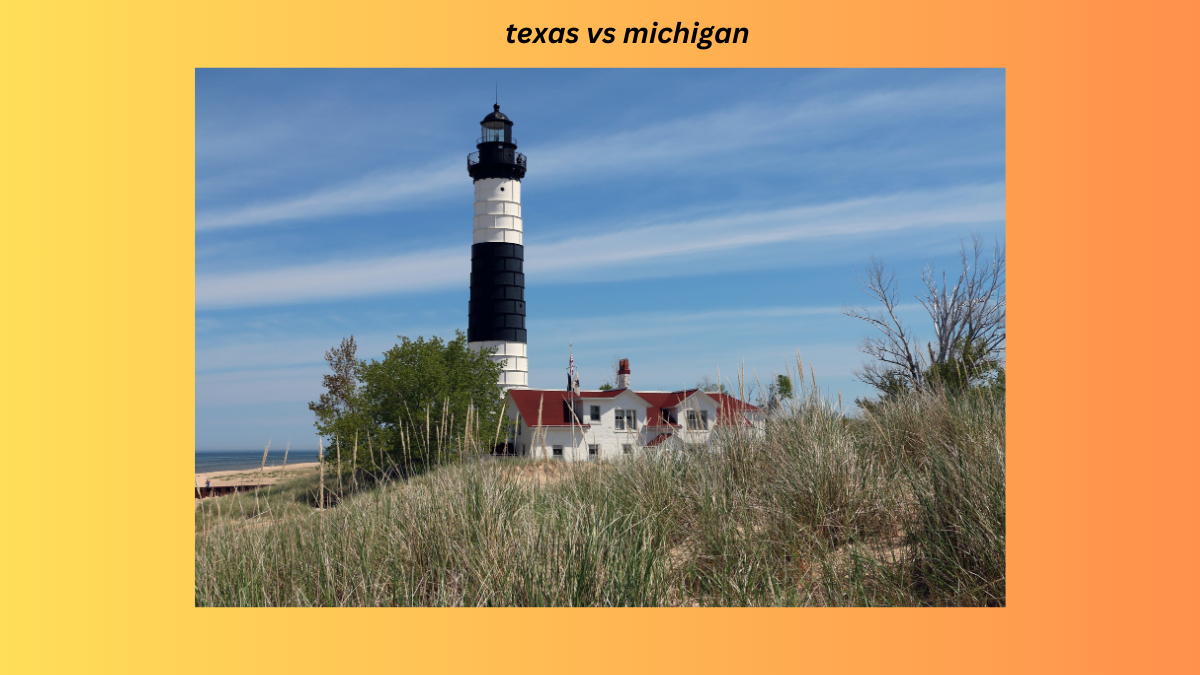Texas vs. Michigan: A Tale of Two Powerhouse States
When people compare Texas and Michigan, they’re often weighing two unique titans of American culture, geography, economics, and politics. These states, while both critical to the national fabric, represent vastly different climates, economies, histories, and ways of life. Exploring the contrasts between Texas and Michigan reveals not just a snapshot of regional differences but also an insight into what makes each state a distinctive part of the United States.
Geography and Climate
Texas, the second-largest state in the U.S. by area and population, spans a diverse landscape. From the deserts in the west to the lush forests in the east, it has everything from dry, arid plains to subtropical coastlines along the Gulf of Mexico. Summers in Texas are notoriously hot, with temperatures in some parts consistently reaching over 100°F (38°C), especially in cities like Dallas, Houston, and San Antonio.
In contrast, Michigan’s geography is dominated by its proximity to the Great Lakes. Known as the “Great Lakes State,” Michigan boasts the longest freshwater coastline in the U.S. Its weather is markedly different from Texas, with cold winters and heavy snowfall, particularly in the Upper Peninsula and around Lake Michigan. Summers, though warm, are far milder, providing a reprieve from the harsher southern climates. Michigan’s natural beauty also offers thick forests, inland lakes, and stunning autumn colors.
Economy and Industry
Texas has a thriving and diverse economy that is one of the largest in the U.S. Historically fueled by oil, Texas remains a global energy powerhouse. Houston, in particular, is home to the world’s largest concentration of oil refineries and energy-related companies. However, in recent decades, Texas has diversified its economy into other sectors like technology (Austin is a booming tech hub), aerospace, agriculture, and manufacturing. Texas’s business-friendly regulations and no state income tax have attracted a wide variety of industries and entrepreneurs.
Michigan’s economy, on the other hand, is synonymous with the auto industry. Detroit, the state’s largest city, is the birthplace of the automobile industry and is often referred to as “Motor City.” Companies like General Motors, Ford, and Chrysler have deep roots in the state, driving its industrial and manufacturing sectors for over a century. While Michigan was hit hard by the decline of the U.S. auto industry in the late 20th century, the state has since rebounded, with new investments in automotive technology, electric vehicles, and automation. Michigan has also developed strong tourism and agricultural industries, particularly in fruit production (like cherries and apples) and wine.
Education and Innovation
Both Texas and Michigan are home to prestigious universities and research institutions. In Texas, the University of Texas at Austin and Texas A&M University are flagship institutions known for their research output, especially in engineering, energy, and technology. Texas is also home to several top-tier medical research centers, including the Texas Medical Center in Houston, the largest in the world.
Michigan’s academic prowess shines with the University of Michigan in Ann Arbor, one of the top public universities globally, renowned for its research in medicine, engineering, and environmental science. Michigan State University is also a leading institution, especially in agricultural science and veterinary medicine. Additionally, Michigan’s automotive research continues to be a cornerstone of its innovation landscape, with Ann Arbor emerging as a hub for autonomous vehicle development.
Politics and Culture
Politically, Texas and Michigan present an interesting contrast. Texas has long been a Republican stronghold, known for its conservative policies on taxes, gun rights, and immigration. However, demographic changes and population growth in urban areas like Austin, Houston, and Dallas have introduced more political diversity, with some of these cities leaning more progressive. The state is also a cultural crossroads, mixing southern traditions with a strong Mexican influence, particularly along the border.
Michigan, by contrast, is often seen as a swing state in national elections. The state’s political landscape is more balanced between urban areas that lean Democratic, like Detroit, and rural areas that tend to vote Republican. Michigan’s blue-collar roots and strong labor union presence have also shaped its political identity, though like Texas, its politics are shifting as urban and suburban areas grow.
Sports and Rivalries
Both states are passionate about sports, with deep-rooted rivalries that reflect the pride of their people. In Texas, football is almost a religion, from high school to college to the NFL, where teams like the Dallas Cowboys and the Houston Texans have huge followings. The University of Texas Longhorns and Texas A&M Aggies both have storied football programs with massive fan bases.
Michigan, though smaller in population, has no shortage of sporting traditions. College football in Michigan is dominated by the University of Michigan Wolverines and Michigan State Spartans, whose rivalry is one of the fiercest in college sports. Detroit is home to several professional teams: the Lions (NFL), Tigers (MLB), Red Wings (NHL), and Pistons (NBA), each of which commands a loyal following, though recent years have seen mixed success.
Conclusion
Texas and Michigan are two states that highlight the diversity of the American experience. Texas, with its vast size, booming economy, and unique blend of cultures, stands in contrast to Michigan’s industrial roots, cold climate, and beautiful freshwater coastlines. Each state offers something special to the U.S., and despite their differences, both are integral to the nation’s story of innovation, resilience, and community. Whether you’re drawn to the wide-open spaces of Texas or the rolling hills and lakes of Michigan, these states are rich in heritage and continue to be drivers of change in the 21st century.
